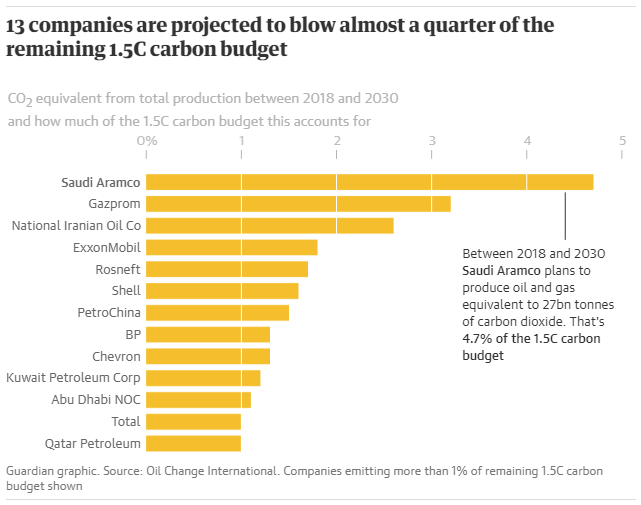Energy
Ignoring Climate Peril, Oil Companies on Track to Lift Production by 7 Million Barrels

Published:
Last Updated:

The world’s largest privately held oil companies have recently been touting both their expenditures aimed at reducing carbon dioxide emissions and at how much greenhouse gas (GHG) emissions they will be avoiding. For reference, in 2018 global carbon emissions totaled a record 37.1 billion metric tons (tonnes). The 2018 total was 2.7% higher than the total emitted in 2017, which was 1.6% higher than 2016 emissions.
If anyone expects carbon emissions to fall anytime soon, well, now might be a good time to reassess those expectations. According to a new study from energy consulting firm Rystad Energy commissioned by the Guardian, the world’s 50 largest oil companies are forecast to add 7 million barrels a day of new production by 2030.
Over the 12-year period in the Rystad Energy study, a carbon dioxide emissions reduction of 45% would be needed to maintain any chance of keeping global warming near a level of 1.5° Celsius, an increase that scientists say is “relatively safe.” Adding 7 million daily barrels to supply implies a roughly equal demand. If that equation holds true, oil companies are set to virtually single-handedly close off any hope of a 45% reduction in carbon emissions.
Lorne Stockman, a senior research analyst at Oil Change International, told the Guardian, “Rather than planning an orderly decline in production, they are doubling down and acting like there is no climate crisis.”
To Dieter Helm of Oxford University, the reasoning is simple: “If we were serious about addressing climate change we would leave some oil in the ground, so there is a scramble among big oil companies to make sure their assets are not the ones left stranded. Their answer is to pump as much as they can, while they still can, to keep delivering shareholder dividends. But the problem for the rest of us is that they are going to produce far more oil and gas than is consistent with the Paris agreement.”
To Stockman the options are stark: “This presents us with a simple choice: shut them down or face extreme climate disruption.”
The companies responsible for the biggest additions to the world’s carbon budget are national oil companies: Saudi Aramco, Russia’s Gazprom and Iran’s National Iranian Oil Co. The following chart from the Guardian lists the 13 companies that will contribute most to carbon dioxide emissions from their total production over the next 12 years.
According to the Guardian, Exxon Mobil is expected to increase its production by 35% by 2030, while BP is tabbed to raise production by 20% and Total should see an increase of 12%. The leader, though, is Shell, projected to boost production by 38% by 2030. None of the top 20 companies included in the study disputed the projections.
The oil industry faces issues today that threaten its very existence. Making a bet to raise production over the next 12 years may be the last chance the industry has to reap a payback for what inevitably will become higher and higher exploration and production costs. Prices eventually won’t be able to keep pace with costs.
At least one recent study suggests renewables could replace 40% of the global demand for crude. Resistance to that kind of pressure will be intense because it means lost profits for shareholders, lost political clout for corporations and lost jobs for people.
Are you ready for retirement? Planning for retirement can be overwhelming, that’s why it could be a good idea to speak to a fiduciary financial advisor about your goals today.
Start by taking this retirement quiz right here from SmartAsset that will match you with up to 3 financial advisors that serve your area and beyond in 5 minutes. Smart Asset is now matching over 50,000 people a month.
Click here now to get started.
Thank you for reading! Have some feedback for us?
Contact the 24/7 Wall St. editorial team.